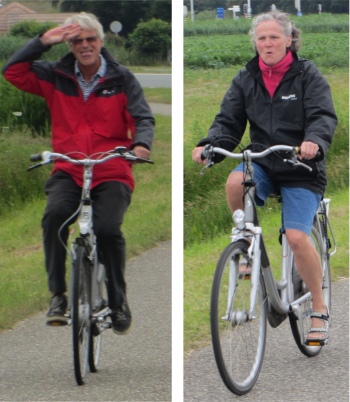 Cycling Dynamic Duo, Fresh as Daisies |
The warship we had noticed anchored in the Marsdiep lifted anchor and slowly moved out into the North Sea, a couple of fishing boats drifted into the Waddenzee on the fast moving incoming tide, and a gas field support vessel chugged along with its fresh supplies. Gulls hovered about the ferry as it sped along, hoping for titbits, but today there were not as many children to feed them.
Hiring three bikes was painless. Rex wanted an electric bike to aid his power output and to leave Meryl standing. He thought this would increase his range up to 40km, as if! "I need a 100 euro deposit for the electric bike, plus I need to see your passport," said the woman at the till. None of us had a passport with us, so I showed her my bus pass. The poor woman had no idea what she was looking at, but it seemed to suffice.
Soon we were hurtling as free as the wind (perhaps because the wind was behind us) in a northerly direction along N501, and then we turned off to Oudeschild. Our route took us down a very long cycle path which ran adjacent to the road, passing peat walls, which Texel has in abundance, and lush fields separated by ditches hemmed in by reed beds. A cacophony of water fowl provided a melody over the background hum of the wind whistling through the reeds and trees.
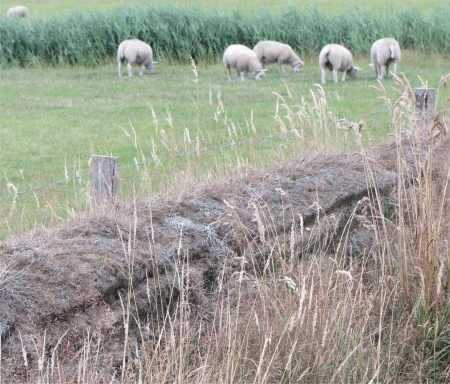 Peat Wall |
Today Oudeschild is a small town, full of picturesque, quaint and typically Dutch houses sheltering behind the dyke that protected them from the Waddenzee. Passing the windmill at the top end of the town, we located the harbour, home to the fishing fleet, with a fair number of trawlers.
Precipitation had started by now, so we took shelter in a cafe on the harbour front, together with other likeminded souls. Hot chocolate and coffees warmed us up, but by now it was teeming down outside. There was only one thing we could do in such circumstances, have another drink.
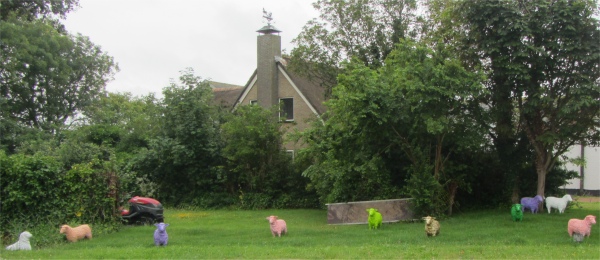 Designer Sheep |
Gradually the rain eased off, and we joined the mass exodus from the cafe, and continued our exploration. Within a mere couple of metres Rex was bellowing out, "My electrics don't work!" True, there was no sign of life in any of the LEDs on the machine. We checked cabling, battery and switches, pressed, tugged and hit, but nothing sprung into life. Rex was on the verge of despair; he would now have to pedal like the rest of us. No longer could he aim for a 40km ride. After a further series of expletives, a sulky Rex joined us in our cycle across to Den Burg, the capital of Texel.
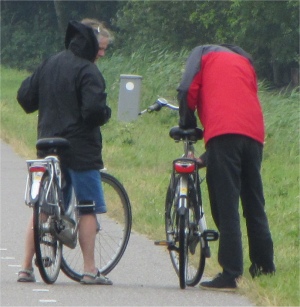 Blast This Bike |
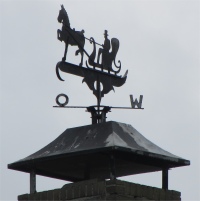 Handsome Weather Vane |
We had spent some time in Den Burg two years back. It was heaven to Meryl, she adored walking amongst the shops, full of clothes and gift shops, and she even remembered a shop from our previous visit.
By chance, we walked past a group of Dutch who I recognised from the bike hire place, and they had also passed us on our journey up the N501. I spotted one of the ladies had an electric bike too, so I walked up to her and asked her if there was a secret way of restoring power to the machine. "Ah yes," she said. "You are still in standby. You must press the black button at the back of the bike," she added, pointing to an innocuous piece of black plastic sitting just above the rear light. "Dank je well," we all echoed to her. Rex's spirits lifted immediately, his face resembling that of a small child who has just received a present from Santa.
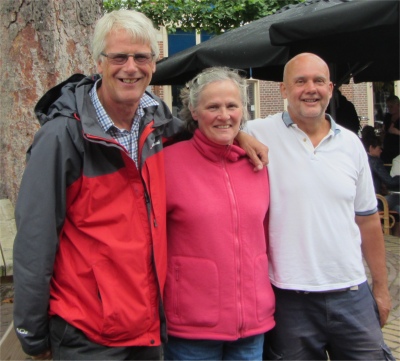 Back in Den Burg Again |
Once replete, we went out into the square, and I collared a young fellow to take our photo at the very same place where we had one taken two years ago. "Take three, four or five," I urged him. He took several from different angles, trying to get his girlfriend in the background too. He even gained a high vantage point to take a snap. "People will see my shortage of hair," I joked with him. "Don't worry," he quipped, "the people who will see this already know you have a shortage of hair." We all fell about laughing at that quirky comment.
While strolling back to the bikes, Rex came up with another bike problem, "I can't find the key to the bike lock." He frantically searched every nook and cranny of his clothing; no it was not there, he must have dropped it somewhere. There was only one thing for it. Go back to the bikes, then follow the same route taken to see if we could spot it on the ground. So, we got back to the bikes, and ..... there in his bike lock was the key. Rex and bikes just don't go together.
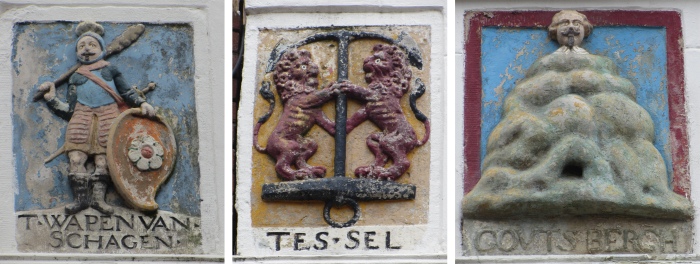 Reliefs in Den Burg |
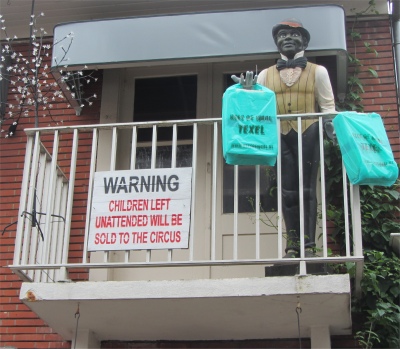 Texel Humour |
She was a bubbly lady who spent the time of day chatting away with us. "Where are you going to?" she asked. "De Waal," we replied. We soon learned that she lived there. "You have good weather coming, look at the blue sky," she said, pointing to a thin slither of blue sitting above the horizon to the south-west of us.
"Do you get fed up with all the tourists?" Rex enquired. We had to explain the concept of "fed up" in this context to her, but the lady can be forgiven, English is not the easiest of languages. "Oh no, we need the tourists, we could not survive otherwise," she quickly replied. "But you have farming here," said Rex, sweeping his hand around at the vast expanse of fields surrounding us. "Ah, the farmers have problems here," she answered. "There are powerful groups who want to turn over a lot of farmland to nature. They have a lot of financial backing, and the ear of the government. These groups want more bird life on the land, but what are we getting, lots and lots of geese, and they destroy everything. All the wild flowers disappear, they leave a mess, and they are noisy."
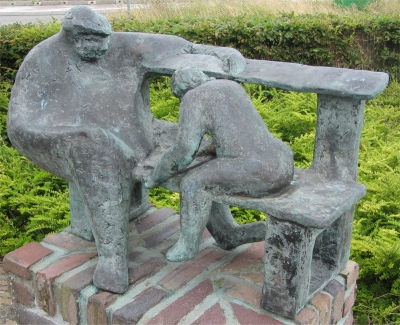 Quiet Moment in De Waal |
By this time the bike hire company turned up with a replacement bike for Meryl, so we thanked the kind lady profusely, and she carried on her cycle ride to Den Haag whilst we continued to De Waal.
With just over 400 inhabitants, De Waal is the smallest village on the island, and similar to Den Burg, Oosterend and Den Hoorn, built on one of the boulder clay outcrops. The village sits above the Waalenburg polder. Prior to the polder being dried out for the first time in 1436, the sea could flow freely between De Waal and the high country around Den Burg. De Waal was indeed small, and no sooner had we cycled into this picture-postcard village, than we found ourselves popping out the other side.
The lady had mentioned that the cycle route from De Waal to Oudeschild was an excellent one to take since it went through a patch of forest. We took her advice and headed off under brightening skies, passing fields full of potatoes and wheat, and farms with large mounds of sweet smelling silage dotted around them.


